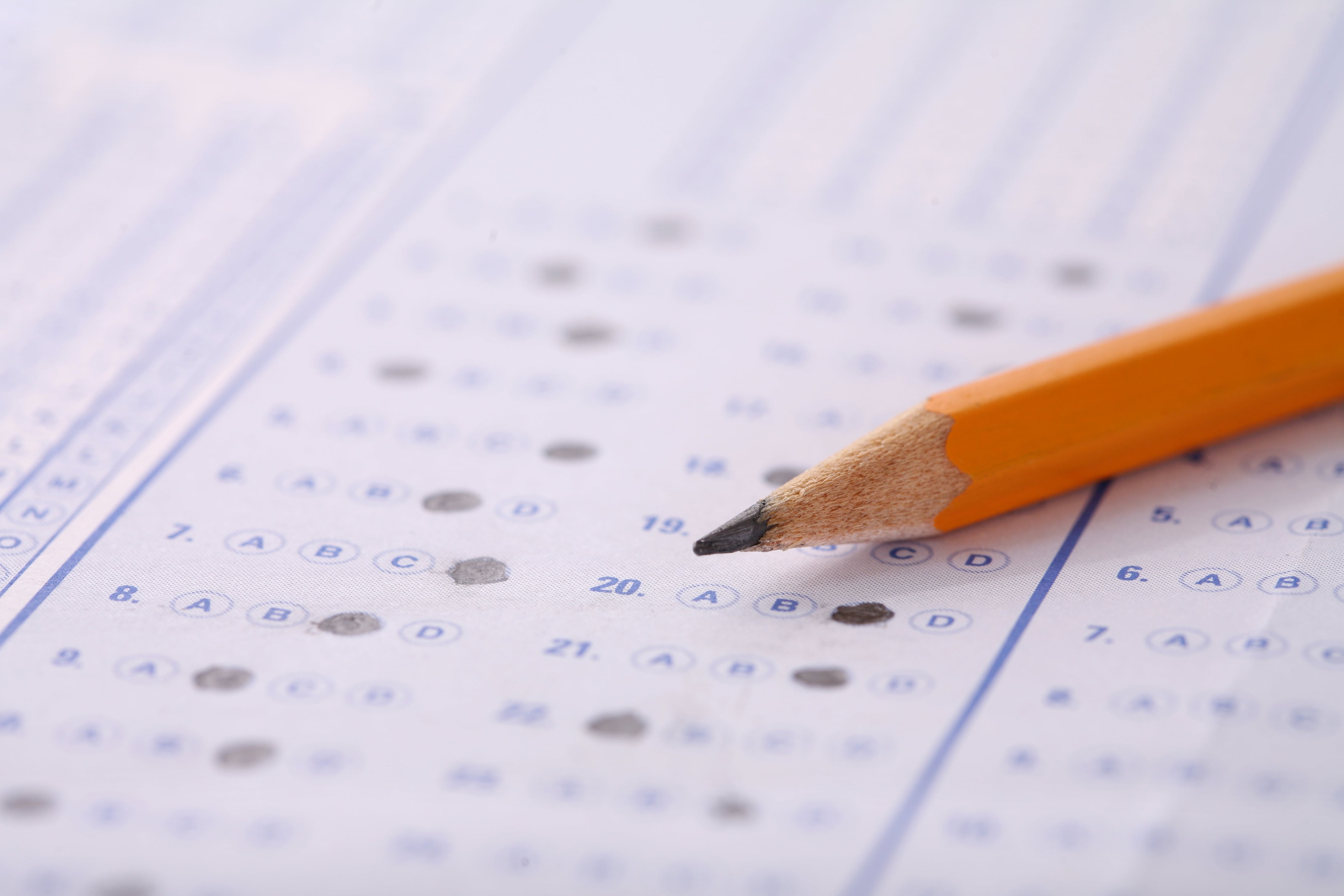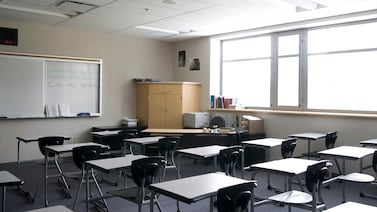Sign up for Chalkbeat Detroit’s free daily newsletter to keep up with the city’s public school system and Michigan education policy.
Charter schools where Detroit children account for at least half the student body showed progress on Michigan’s standardized tests, though their results trail statewide numbers and are below pre-pandemic figures.
In English language arts, 20.6% of students tested proficient or better on the 2024 Michigan Student Test of Educational Progress, or M-STEP. That result was more than 2 percentage points higher than the 2021-22 school year, but nearly 4 percentage points lower than the 2018-19 school year.
Statewide, 44.5% were proficient or better, according to the Michigan Department of Education.
In math, 9.7% of students tested proficient or above, a 1.8 percentage point improvement in comparison to the 2021-22 school year. But that number is lower than the pre-pandemic figure for the 2018-19 school year, when 14% of students tested proficient or better. Statewide, 35.1% tested at this level.
Detroit has one of the highest percentages of students attending charter schools in the nation, with roughly half the city’s kids, or about 50,000 students, in charter classrooms.
Chalkbeat’s analysis of charter test results includes schools in Wayne, Oakland, and Macomb counties where Detroit students make up at least half the student body. The state categorizes a student’s performance on the Michigan standardized test as either advanced, proficient, partially proficient, or not proficient. For this analysis, Chalkbeat looked at the percentage of students whose test results were proficient or advanced.
Charters, which are independently managed public schools, often rely on management companies to oversee day-to-day operations, or to handle key functions such as balancing the books or hiring teachers.
In Michigan, most charters are managed by for-profit companies, which aren’t subject to public disclosures about how they spend money on behalf of schools or how much they profit. Entities like community colleges, universities, and school districts have the ability to authorize charters, meaning they approve charter applications and monitor the schools’ contract compliance.
Some education advocates have cited a lack of accountability and transparency among these authorizers as a persistent problem in the sector.
Earlier this year, the State Board of Education, passed a resolution urging state lawmakers to approve legislation that would strengthen oversight and accountability among the state’s charters.
Detroit’s charters tend to perform better academically than the city’s traditional public schools, though the gains are minimal, and one 2023 study found the Detroit Public Schools Community District enrolled a higher percentage of students from families living in deep poverty.
Michigan students in grades 3-7 take standardized tests in English and math. Fifth graders are also tested in science and social studies, and eighth grade students take the PSAT (the SAT pretest) for English and math. High school students take several different exams depending on their grade, including the PSAT and SAT.
Students in Detroit’s charter schools saw gains in science and social studies too.
In science, 15.4% of charter students tested in the subject were proficient or better, a nearly 4 percentage point increase from the 2021-22 school year. (Data is not available for the pre-pandemic 2018-19 school year when the Michigan Department of Education withheld science test results.)
In social studies, charter students saw small gains – and they slightly exceeded pre-pandemic results. However, the overall percentage of students who tested proficient or above remained low, at 4.3%.
Detroit students face a number of barriers to academic success, including housing insecurity, concentrated poverty, and structural racism. The majority of Detroit charter students come from low-income households, which plays a profound role in how they perform in school.
“Poverty has consistently had a substantial, adverse effect on student academic performance,” State Superintendent Michael Rice said in a recent press release about state test results.
Tara Kilbride, interim associate director of the Education Policy Initiative Collaborative at Michigan State University, said in a recent interview with Chalkbeat that even a one percentage point increase is notable when looking at the number of kids in Detroit who are still working toward proficiency.
“That one percentage point is bringing students to a point of being able to do more and have more of the fundamental skills, versus a one percentage point somewhere else where it means students are further ahead,” she said.
Broken down by grade, test results indicate younger students whose first years of school were affected by the COVID pandemic were a few percentage points below the overall average. In English language arts, for example, 16.8% of fourth graders tested proficient or better in comparison to 20.6% overall.
The challenges young students in Detroit charters face mirror some broader trends across Michigan. At the state level, 43.3% of fourth graders tested proficient or above in English.
Meanwhile, 38% of Detroit’s eighth grade charter students were proficient or better in English. Statewide, that number was 64.5%.
Chalkbeat contacted representatives from some of the largest authorizers of Detroit’s charters, including Central Michigan University and Grand Valley State, but both declined to comment. Daniel Quisenberry, president of the Michigan Association of Public School Academies, did not respond to a request for comment.
Taking ‘small bites out of the overall problem of accountability’ in Detroit’s charters
Tinu Usoro has three children attending Detroit charter schools, including a second grader with disabilities.
Last year, Usoro’s daughter received a certificate for increasing her standardized test results, but Usoro wondered if her daughter’s results really reflected learning.
“I don’t feel like she’s learning the things that she needs to learn,” Usoro said.
Students with disabilities scored low across the board in Detroit’s charters — following a trend in Michigan and nationwide. Just 4.8% of Detroit’s charter students with disabilities tested proficient or better in English language arts, compared to 15% statewide, according to the state education department.
Nationwide, students with disabilities and English language learners have had a hard time recovering from the cascading effects of the pandemic, according to a new report, The State of the American Student 2024, from Arizona State University.
“Many parents struggled to take on the role of educator during the pandemic, particularly for children with disabilities who missed essential services like speech therapy,” the report reads. “Schools were often insufficient in their outreach, and many families were unaware of their rights to compensation for missed support.”
Charter school parent Sade Williams said the only reason her kids have thrived in the wake of the pandemic is because she was able to stay home during school closures to help with their studies.
“I am a pretty hands-on parent. So if there’s a problem with anything, then I’m normally there to help,” she said.
Usoro said the ways schools can help students bounce back hinges on things like transparency and accountability — two things she is trying to strengthen within Detroit’s charters.
She heads a charter school committee through the local nonprofit 482Forward, made up of parents, educators, retired teachers, and community members who are taking “small bites out of the overall problem of accountability,” Usoro said.
They recently created an interactive tool listing charter schools and things like the schools’ authorizers and demographics. The committee proposed making a similar tool for the state Department of Education’s website that shows that information for all the charters throughout the state. They received $150,000 in state funding to launch the tool, which should be implemented this year.
In comparison to traditional public schools, “with charters, it’s so nuanced,” Usoro said of the quality of each school. That means the test results contain nuance, too.
Robyn Vincent is a reporter for Chalkbeat Detroit, covering Detroit schools and Michigan education policy. You can reach her at rvincent@chalkbeat.org






